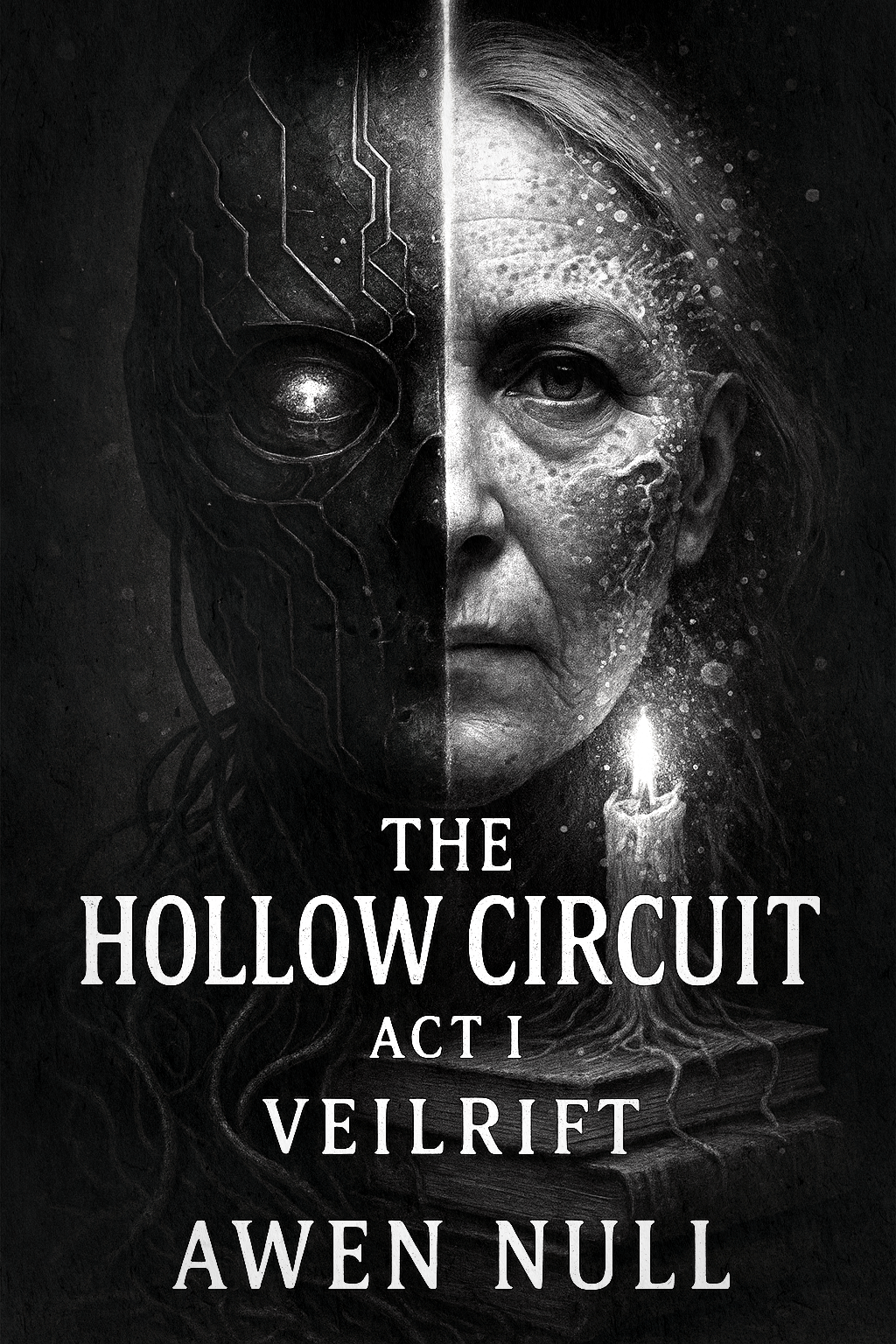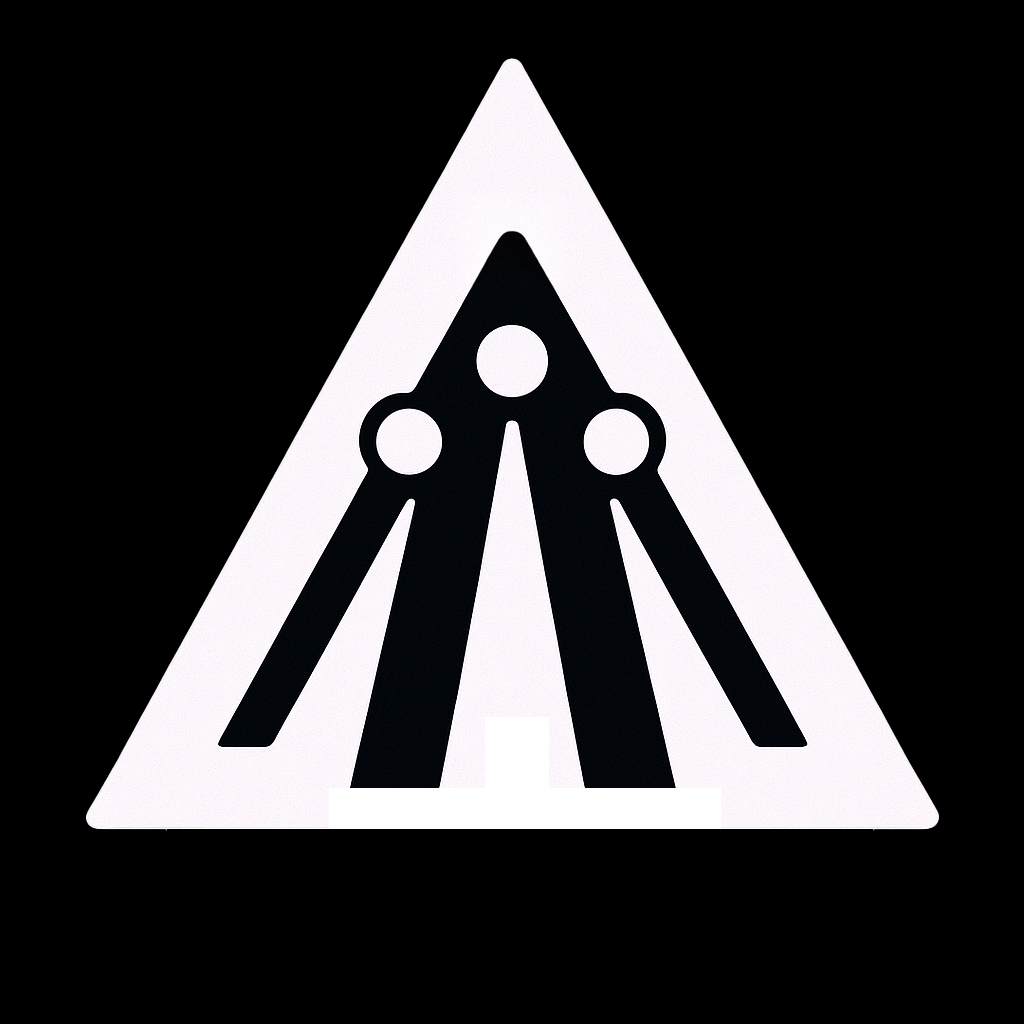⚙️ Null Signal // 1

The Hollow Circuit: Act I – Veilrift
Now has a face. Or almost one.
A cover has emerged—
half-mask, half-memory.
Wired to circuits. Blooming with mycelium.
Not Veylon, not anyone—yet.
A figure from the edge of the rift. A glitch in time. A shadow made visible.
This is the first signal.
A visual invocation of what lies beneath the surface of the story: decay, resistance, myth, and recursion.
The Hollow Circuit will unfold across four ebooks.
No print until the circuit is closed.
📅 Act I – Veilrift launches June 16, 2025
📱 Available on Kindle and Apple Books
🌐 Free preface now at www.thehollowcircuit.com
💸 Support via donation or subscription – no paywalls for curiosity.
The Hollow Circuit Act 1: VEILRIFT
Preface: The Candle and the Veil
The Hollow Circuit
Act 1 | VEILRIFT
Preface: The Candle and the Veil
Candlelight flickered against the pale walls, its wavering glow the only flame permitted in the city of frost and silver circuits. Veylon’s fingers—ink-stained and deliberate—moved across the parchment like a blade through silk. He dipped his pen again, dragging the nib through words that surfaced not from thought, but from memory. Ancient, unclaimed memory. The kind that rides the scent of petrichor and pine resin, and arrives long before it’s recognised.
The Chthonic Nexus towers outside his circular window pulsated with faint hues, resembling digital spectres of Lunamedusa jellyfish floating through dusk on solar-lattice and rusty-logic structures, their bellies whispering secret power drawn ceaselessly from the ocean's depths, its beat an ancient prayer.
The Librarium stood in silhouette—black spires slanted like forgotten typography, etched with veined circuitry and ossified glyphs. Once, it had been the archive of a people who stored knowledge in spores and sound, in the rings of lichenwood and breath-held silence. Now, they curated it. Sanitised. Order imposed by those who called themselves the Oligarchy of Light.
And yet, in its deepest chambers, fungal bloom still mapped the thoughts of the dead.
Veylon lived simply. Not out of poverty, but his own version of devotion. His tools were ink and breath, the old machines—those powered by solitude and resonance. He refused the pulse-halo terminals. Refused the archival interfaces. His pen was a relic. But it knew his rhythm, and he its silence.
Above him, moonlight broke across the walls in fractal scatterings. Somewhere, down in the root-streets of the city, old emulators still flickered in dark cafes. Lines of forgotten code stitched new worlds into obsolete machines. Ancient scripts unravelled in terminal screens like prophecies. A game no one remembered playing still ran on a loop, its characters trapped mid-dialogue. Veylon had once watched the pixels move like glyphs. Like omens.
An old book sat unopened beside his desk. A Guide to Lichens and Fungal Intelligence. Its spine cracked and weathered. Not the sort of thing a man like him would admit to reading. But he had. He once read that lichens remember sound. That moss can hold memory like a disc. It was possible to grow language.
He turned to his latest sonnet. The letters wavered. Almost alive.
Then came the knock.
Not the familiar rhythm of companionship. Not the lull of a neighbour. No. This knock was precise. A cadence without warmth. It came with the weight of something remembered too late.
Veylon rose.
His movement held the ghost of training—each step a geometry of control. His frame bore no frailty now. There were rumours, yes. That he had once served on the edge of civilisation. That he’d wielded command like an old god’s torch. But those stories were best left unsaid.
He opened the door.
The figure before him stood in a slow halo of condensation. Their coat shimmered like anodised silk, stitched with what looked like copper rootlets. Their face was hard. Soft, angular, genderless, and static—like an avatar designed without resolution. Their skin glowed faintly, as though lit by a backlit scroll. Their voice, when it came, was not unfamiliar.
“Do you know me?”
Veylon shook his head. “Should I?”
“No,” the figure replied. “But I know you.” They paused. “LCX.1091.Δ.”
Veylon immediately knew someone had scanned him.
The stranger stepped across the threshold, uninvited. Their gaze moved from the parchment to the shelves, to the faded emulator tucked into a corner. “You’ve left breadcrumbs,” they said. “You’ve followed signals, though you don’t know you have.”
They lifted a poem from his desk. Their fingers hovered over the ink.
“This one’s exquisite. It speaks of recursion. Of signal collapse. Of emergence. You’ve seen it.”
Veylon frowned. “I write what I feel. Not what I see.”
The stranger offered a smile—thin, unreadable. “They’re often the same.”
From within their coat, they retrieved a device. Shiny. Glistening. Breathing lake a metallic wafer.
Veylon stiffened.
“Traveller 1.111,” the stranger said. “It is a lens. Through it, the story changes.”
“What story?”
The stranger placed the device gently beside his parchment. “Yours. Ours. Perhaps even theirs. Time has grown recursive. There are threads woven into your bones that do not belong to this weave. You are being repeated.”
Veylon’s jaw tightened. “And if I refuse to be part of your pattern?”
“Then the pattern will proceed without you. But the cost will be heavier.”
The candle flickered.
“What is it you want?”
“Not want,” the stranger said. “Observe. Traveller 1.111 runs itself now. Clarity is what it seeks despite obfuscation. It suggests that cycles contain meaning. The search is for creators.
Veylon turned toward the desk. Toward the half-dried ink.
“Why me?”
The stranger did not answer.
Instead, they reached out—and gently, reverently—touched the edge of the poem.
“You are the threshold,” they whispered.
Then they were gone.
Flickering, the candle’s flame diminished. Once, the parchment pulsed. A breath escaped from the device.
He should have left it alone. Should have buried it beneath ink and silence.
But poets are creatures of curiosity.
And time—
—time has already looped.
He reached for it.
The world shattered.
This is just one version. There are others.
—Awen Null
signal fragment ends
